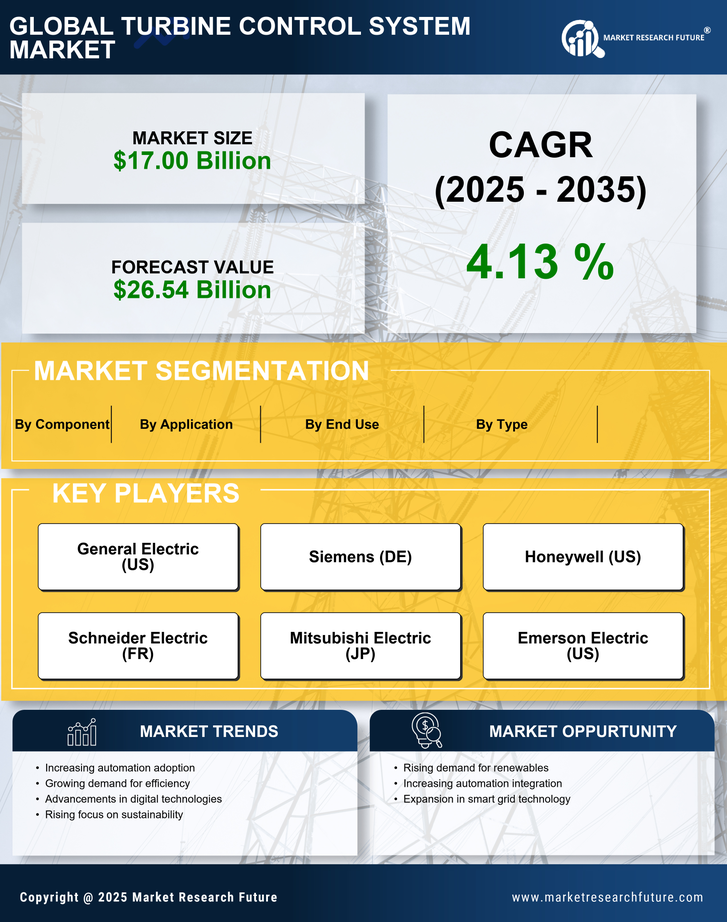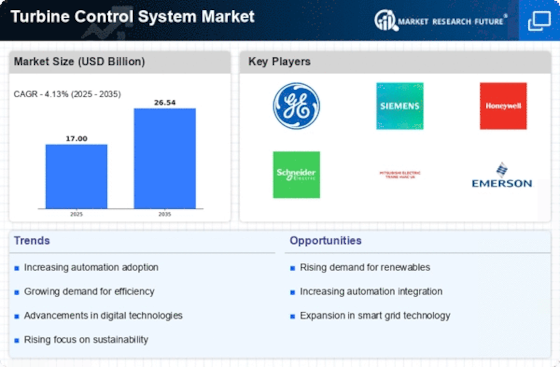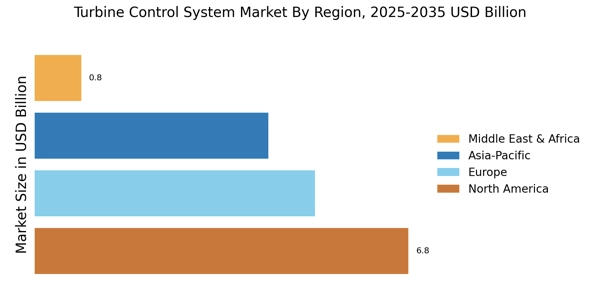Rising Demand for Renewable Energy Sources
The increasing demand for renewable energy sources is a pivotal driver in the Turbine Control System Market. As nations strive to meet sustainability goals, the deployment of wind and hydroelectric power is on the rise. This shift necessitates advanced turbine control systems to manage the complexities of renewable energy generation. According to recent data, investments in renewable energy technologies are expected to exceed $1 trillion by 2025, highlighting the urgency for efficient turbine control solutions. Consequently, the market for turbine control systems is likely to expand as energy producers seek to enhance the reliability and efficiency of their renewable energy assets.
Increased Investment in Energy Infrastructure
Increased investment in energy infrastructure is a critical driver for the Turbine Control System Market. As countries modernize their energy grids and expand renewable energy projects, the need for sophisticated turbine control systems becomes paramount. Recent reports indicate that global investments in energy infrastructure are projected to reach $2 trillion by 2025, underscoring the urgency for efficient turbine management solutions. This influx of capital is likely to stimulate demand for advanced turbine control systems, as energy producers seek to enhance operational efficiency and reliability. Consequently, the market is expected to experience robust growth, driven by these substantial investments.
Integration of IoT in Turbine Control Systems
The integration of Internet of Things (IoT) technology into the Turbine Control System Market is transforming operational efficiency. IoT enables real-time monitoring and data analytics, allowing for predictive maintenance and enhanced performance. This technological advancement is expected to drive market growth, as companies increasingly adopt IoT-enabled systems to optimize turbine operations. The market for IoT in turbine control systems is projected to grow significantly, with estimates suggesting a compound annual growth rate of over 20% in the coming years. This trend indicates a shift towards smarter, more connected turbine systems, which could lead to reduced downtime and improved energy output.
Technological Advancements in Control Systems
Technological advancements in control systems are reshaping the Turbine Control System Market. Innovations such as artificial intelligence and machine learning are being integrated into turbine control systems, enhancing their efficiency and reliability. These technologies allow for better data analysis and decision-making processes, which are crucial for optimizing turbine performance. The market is witnessing a surge in demand for these advanced control systems, with estimates suggesting a growth rate of approximately 15% annually. As companies seek to leverage these technologies, the turbine control systems that incorporate such advancements are likely to gain a competitive edge, further driving market dynamics.
Regulatory Support for Clean Energy Initiatives
Regulatory frameworks supporting clean energy initiatives are significantly influencing the Turbine Control System Market. Governments worldwide are implementing policies that promote the use of renewable energy, which in turn drives the demand for advanced turbine control systems. For instance, incentives for wind and hydroelectric projects are becoming more prevalent, encouraging investments in turbine technology. This regulatory support is expected to bolster market growth, as companies align their operations with governmental mandates. The anticipated increase in regulatory measures could lead to a market expansion, with projections indicating a potential increase in turbine control system adoption by over 30% in the next five years.


















